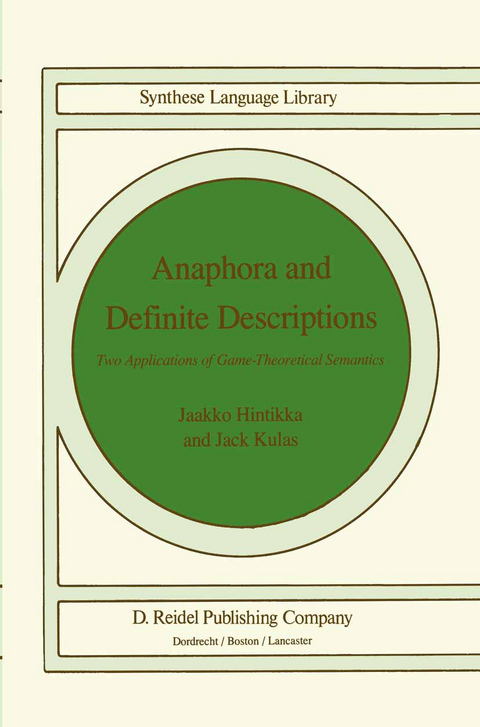
Anaphora and Definite Descriptions
Kluwer Academic Publishers (Verlag)
9789027720559 (ISBN)
Jaakko Hintikka is the author or co-author of thirty volumes and of some 300 scholarly articles in mathematical and philosophical logic, epistemology, language theory, philosophy of science, history of ideas and history of philosophy, including Aristotle, Descartes, Leibniz, Kant, Peirce, The Bloomsbury Group, Husserl and Wittgenstein. He has also been active in international scholarly organizations, most recently as the First Vice-President of FISP, Vice-President of IIP and Co-Chair of the American Organizing Committee of the Twentieth World Congress of Philosophy. He has been Editor-in-Chief of the International Journal Synthese and the Managing Editor of Synthese Library since 1965.
I: Introduction to Game-Theoretical Semantics.- 1. General.- 2. Formal first-order languages.- 3. Equivalence with Tarski-type truth-definitions.- 4. Translation to higher-order languages.- 5. Partially ordered quantifiers.- 6. Subgames and functional interpretations.- 7. Extension to natural languages.- 8. Similarities and differences between formal and natural languages.- 9. Competing ordering principles.- 10. Atomic sentences.- 11. Further rules for natural languages.- 12. Explanatory strategies.- Notes to Part I.- II: Definite Descriptions.- 1. Russell on definite descriptions.- 2. Prima facie difficulties with Russell’s theory.- 3. Can we localize Russell’s theory?.- 4. Game-theoretical solution to the localization problem.- 5. Anaphoric “the” in formal languages.- 6. Applications.- 7. Epithetic and counterepithetic the-phrases.- 8. Vagaries of the alleged head-anaphor relation.- 9. The anaphoric use of definite descriptions as a semantical phenomenon.- 10. The quantifier-exclusion phenomenon in natural languages.- 11. Inductive choice sets.- 12. Other uses of “the”.- 13. The Russellian use.- 14. The generic use motivated.- 15. Conclusions from the “pragmatic deduction”.- Notes to Part II.- III: Towards a Semantical Theory of Pronominal Anaphora.- I: Different Approaches to Anaphora.- II: A Game-Theoretical Approach to Anaphora.- III: The Exclusion Principle.- IV: General Theoretical Issues.- V: GTS expalains Coreference Restrictions.- VI: Comparisons with Other Treatments.- Notes to Part III.- Name Index.
| Erscheint lt. Verlag | 31.8.1985 |
|---|---|
| Reihe/Serie | Studies in Linguistics and Philosophy ; 26 |
| Zusatzinfo | XIV, 250 p. |
| Verlagsort | Dordrecht |
| Sprache | englisch |
| Maße | 155 x 235 mm |
| Themenwelt | Geisteswissenschaften ► Philosophie ► Sprachphilosophie |
| Geisteswissenschaften ► Sprach- / Literaturwissenschaft ► Sprachwissenschaft | |
| Sozialwissenschaften | |
| ISBN-13 | 9789027720559 / 9789027720559 |
| Zustand | Neuware |
| Informationen gemäß Produktsicherheitsverordnung (GPSR) | |
| Haben Sie eine Frage zum Produkt? |
aus dem Bereich


